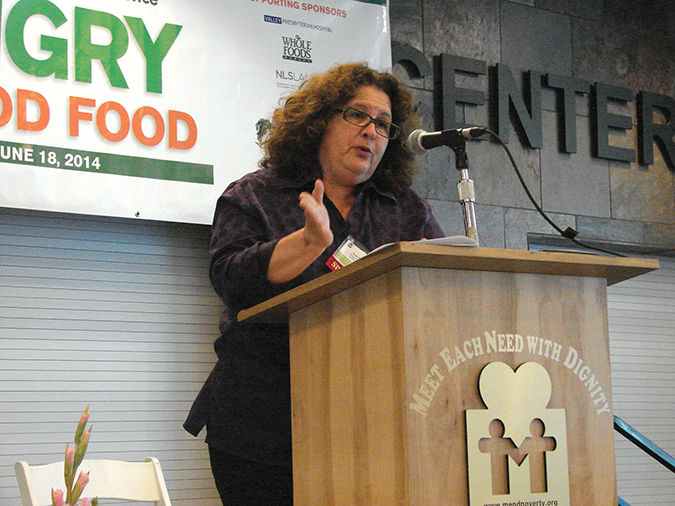Government policies aimed at alleviating hunger and poverty are essential to eliminating food insecurity among 49 million Americans, said a nationally-recognized hunger expert at a poverty conference in Pacoima June 18.
Keynote speaker Joel Berg, executive director of the New York City Coalition Against Hunger, told more than 200 community leaders gathered at the MEND (Meet Each Need With Dignity) Center for its “Hungry for Good Food” conference that structural problems with the U.S. economy “can and should be fixed,” to solve the growing hunger rate.
“By the late 1970s, we almost entirely ended hunger in America” with the War on Poverty, said Berg, who noted that there were just a few hundred feeding agencies nationwide in 1978 compared to more than 40,000 today, mostly serving poor working families.
“If you’re paying in rent what you earn, all the financial [and nutrition] education in the world isn’t going to solve the problem,” said Berg. “What’s going to solve the problem is change in our government policies, once again insuring people have jobs that pay a living wage, and when that living wage isn’t enough, they get federal nutrition assistance and other anti-poverty safety net [programs] to allow them to survive. That’s what other civilized countries do; that’s what we did in the 1970s to almost end hunger in America.”
He warned the audience against falling for false perceptions circulating in society. The notion that it’s poor people’s own fault for their poverty because they “are not working hard enough, having too many babies or getting too much cash welfare” has been largely disproved, according to Berg, because poverty has grown in spite of ’90s welfare reform that included recipient work requirements and placed time limits on welfare assistance.
He noted that, before the 18-month Great Recession starting in December 2007, employment had increased dramatically among poor people, particularly women (participating in welfare-to-work programs), the teenage pregnancy rate had dropped, the crack cocaine epidemic had ebbed, and most big cities had a reduction in violence.
In spite of all these societal improvements, Berg pointed out, poverty rates climbed during the economic downturn and in succeeding years of jobless recovery. “Maybe it wasn’t their fault after all,” he said, sardonically.
He characterized the second myth as the idea of a “bucket brigade” of charities putting out a nationwide “fire” of hunger. “We’ve been given the false impression we can solve it one canned food drive at a time,” said Berg. “That’s just not working; every year they’re giving out more food and more people are going hungry.”
Noting that people in the emergency food system are doing “heroic, vital work” at the community level which is keeping people from starving, Berg said these charitable efforts alone will not end hunger.
“We have to understand this isn’t the solution to the problem,” said Berg. He pointed out that, while food pantries and feeding programs in America annually provide about $5 billion worth of food, federal SNAP/Food Stamp Program benefits were reduced by the same $5 billion amount last Nov. 1.
“Those cuts obliterated one year’s worth of work of every feeding charity in America and, a few months later, Congress voted $8.7 billion in additional cuts,” explained Berg. He stressed how important it is for food security advocates in California to increase participation in the state’s CalFresh program, providing food assistance for eligible low-income residents.
“Most people getting SNAP/CalFresh benefits are seniors, children, working people, people with disabilities, [or] veterans” with $102 million spent last year at military commissaries around the country on the SNAP program, noted Berg.
“Food stamps are social insurance just like social security and Medicare,” he said. “You pay in when you’re working, you take out when you need the help. And, let’s understand: We all need the help.
“A civilized country doesn’t have 16 million of its children without enough food,” added Berg. “A civilized country joins together to build the movement necessary to end hunger once and for all.”
To learn more about MEND, the largest poverty-relief organization in the San Fernando Valley serving as many as 53,000 low-income people each month with its emergency food programs and other educational/medical services, visit www.mendpoverty.org or call (818) 896-0246.

